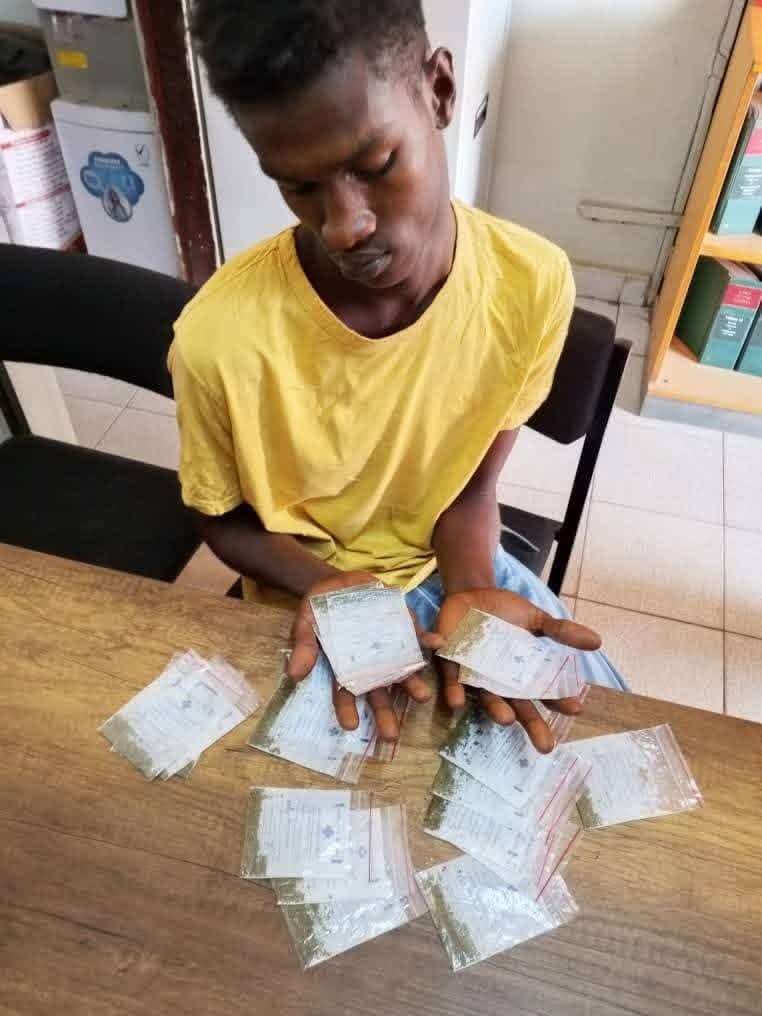On 27th June 2025, the co-chair of the joint FPAC and PEC committee Alhagie S Darboe, Member for Brikama North presented the final report of the inquiry into the importation and sale of Russian oil in the Gambia.
The parliamentary inquiry was triggered by a motion by the Member for Lower Saloum, Sainey Jawara and approved by the National Assembly on 22nd July 2024.
The motion alleged that there was, “inappropriate conduct regarding a sale of oil linked to a so-called international company Apogee FZC, including money laundering, corruption, bribery, and tax evasion.” It is estimated that 36,935.614 metric tonnes of petroleum products valued at thirty million ($30M) US dollars was sold.
The parliamentary inquiry took place from August 2024 to May 2025.
Objective of the inquiry
According to the final report, “The objective of the Inquiry is to investigate the said allegations of bribery and tax evasion by Apogee FZC, Creed Energy Limited and Ultimate Beige Logistics on the sale of petroleum product worth 36,953.614 Metric tons valued at $30,000,000.00 within The Gambia, establish facts and report back to the Plenary.”The inquiry was initially scheduled to last for 90 days, i.e., from July to October 2024.
At the end, the inquiry lasted for 10 months, i.e., until May 2025. Overview of the Report Here is our summary of the key highlights of the final report.
Key Issues
The Joint Committee exposed the following issues in their investigations. Corruption, bribery, and kickbacks involving the sale of 36,935.614 metric tonnes of petroleum products valued at $30 million.
Tax evasion by companies like Apogee FZC/FZE, Creed Energy Gambia, and Ultimate Beige Logistics. Money laundering through suspicious bank transactions and sub-accounts. Regulatory failures by institutions such as the Registrar of Companies, Financial Intelligence Unit (FIU), Gambia Revenue Authority (GRA), and Public Utilities Regulatory Authority (PURA).
Institutional misconduct, including interference in police investigations and preferential treatment of Apogee FZC by Gam-Petroleum and the Ministry of Petroleum. Key Findings Corporate and Regulatory FailuresCompanies like Creed Energy and Ultimate Beige Logistics operated without proper licenses or tax compliance.
The Registrar of Companies under the Ministry of Justice failed to enforce filing requirements or verify business addresses while accepting sworn affidavits instead of required audited accounts. No enforcement of compliance with the Companies Act, 2013.Banks (Access Bank and Ecobank) violated anti-money laundering (AML) rules by allowing unregistered entities such as Apogee FZC to control sub-accounts.
Companies involved had no proper office addresses, failed to file tax returns, or maintain statutory records. Apogee FZC (Dubai-registered) controlled Gambian companies through nominee shareholders.
Money Laundering and Financial Irregularities
Central Bank and Commercial Banks allowed illegal sub-accounts violating AML/CFT regulations.Sub-accounts in Access Bank and Ecobank were operated by Apogee FZC’s agent Aurimas Steiblys, with suspicious cash withdrawals of D600,000 monthly.Apogee FZC, though unregistered in The Gambia, used local companies (Creed Energy, Ultimate Beige) as fronts to funnel proceeds offshore.
Over $3 million was transferred to Apogee FZC’s Dubai accounts without adequate due diligence. Access Bank issued a “comfort letter” to Creed Energy despite its insolvency (balance: D13,000). Money laundering suspicions arose due to layering and obfuscation of transaction trails.
Government and Institutional Misconduct
The former Minister of Petroleum, Abdoulie Jobe (and now the Minister of Tourism and Culture), allegedly bypassed Cabinet approval to create a fictitious policy favoring Apogee FZC. Gam-Petroleum’s General Manager, Yerro Jallow, granted Apogee exclusive ullage space, disadvantaging local Oil Marketing Companies (OMCs), while also illegally acting as an agent of Apogee FZC.
The Gambia Police Force halted investigations under pressure from ‘high command’ linked to former IGP Abdoulie Sanyang, now Interior Minister.
This led to the release of key suspect Mr. Aurimas Steiblys without charge or passport seizure.GPF failed to conduct proper evidence collection, such as bail bonds or formal statements with signatures and dates.
Tax EvasionCreed Energy and Ultimate Beige Logistics evaded taxes totaling D20.8 million. GRA failed to proactively monitor tax compliance until alerted by the FIU. No taxpayer files were maintained for Creed Energy or Ultimate Biege Logistics despite issuing them Tax Identification Numbers (TINs).
Weak OversightPURA lacked enforcement power over upstream petroleum activities. No national petroleum laboratory exists, forcing reliance on foreign quality certifications.
Lack of coordination among key institutions (FIU, GRA, CBG, Police, MoPE, and GamPetroleum).Absence of real-time monitoring, enforcement protocols, or whistleblower protections.
No checks and balances on new policy decisions affecting petroleum sector governance.
Monthly Kickback of GMD600,000
The Financial Intelligence Unit received intelligence that a monthly kickback of D600,000 was being withdrawn from Access Bank account number 0010110000555.The withdrawal was consistently done by Mr.
Aurimas Steiblys, the representative of Apogee FZC.The funds were suspected to be bribes paid to a top government official assisting Apogee in bringing petroleum products into The Gambia.
The identity of the individual receiving the bribe was not named in the report, but the informant described the person as being a senior public official.Role and Responsibility of State House The report did not directly accuse the Office of the President of orchestrating or authorizing the illegal petroleum transactions.
However, evidence suggests its indirect involvement and influence in key events and decisions. Here are the relevant findings regarding the role of State House:
Appointment of Gam-Petroleum General Manager by State House
The General Manager of Gam-Petroleum (Mr. Yorro Jallow) informed the Committee that he was appointed by the Board of Directors based on a recommendation from the Office of the President. “The GM stated he was appointed by the Board of Directors following a recommendation from the Office of the President.” (from the Report)
The significance of this statement is that it establishes a link between the State House and a central actor (Mr. Jallow), who later:Granted exclusive ullage to Apogee FZC,Acted as an agent for Apogee FZC,Introduced Apogee to other stakeholders in the petroleum sector.
Cabinet Taskforce Originated from State House
A Cabinet Taskforce was set up to investigate prior scandals involving missing petroleum products at Gam-Petroleum, leading to Mr. Jallow’s elevation.This indicates prior knowledge at the highest executive levels about irregularities in the petroleum sector.“A Taskforce was established by Cabinet to investigate the matter and report back.”
(from the Report)
The significance is that while not linked directly to the Apogee scandal, this demonstrates ongoing executive interest and intervention in the petroleum sector.
Possible Political Influence in Halting Police InvestigationThe Gambia Police Force testified that their investigation into Apogee FZC and Aurimas Steiblys was halted on orders from “the top.”Initially, the former Inspector General of Police now Minister of the Interior, was identified as the one who gave the order.“Order came from the top… from the former Inspector General of Police, now Minister of the Interior.” (from the Report)
The implication is that since the Interior Minister is part of the President’s Cabinet, this raises questions about political interference at executive level to suppress investigation and protect suspects.
Absence of Presidential Oversight
The report does not show any proactive steps taken by the President or State House to stop or investigate the scandal despite the scale of the transaction and regulatory breakdown.
The lack of executive response or inquiry can be interpreted as negligence or deliberate inaction.
Key Recommendations
The inquiry exposes a systemic failure of governance in the petroleum sector, characterized by regulatory capture, weak institutional oversight, and active facilitation of financial crime. Here is a synopsis of the recommendations which are crucial in restoring public trust, recovering lost revenues, and preventing recurrence.
Legal and Criminal Actions Prosecute individuals like Mr. Aurimas (Apogee FZC), Nana Koranteng (Creed Energy), and Nana Akufo (Ultimate Beige) for money laundering and tax evasion. Censure former Minister Abdoulie Jobe and Interior Minister Abdoulie Sanyang for misconduct.
Institutional Reforms
Strengthen the Registrar of Companies with a compliance unit and inter-agency task forces. Mandate Cabinet approval for sectoral policies (e.g., petroleum) and gazette them. Audit Gam-Petroleum’s ullage allocations and suspend GM Yerro Jallow pending investigation.
Financial Sector Accountability
Sanction Access Bank and Ecobank for AML breaches. Ban sub-accounts controlled by unregistered foreign entities.
Transparency and Governance Establish a national petroleum laboratory and expand PURA’s oversight to upstream activities.
Require OMCs to disclose payment chains and beneficial ownership. Legislative MeasuresEnact a Whistle-blower Protection Act and amend the Companies Act to mandate director resignations be filed with regulators.
onclusion of the Report
The inquiry exposed systemic failures and corruption, weak enforcement, and collusion between private entities and public officials. While direct evidence of bribery was inconclusive, the Committee urged the National Assembly to adopt its recommendations to restore accountability, safeguard revenue, and prevent future abuses.






